The 2011 Good Gift Games
The problem with a trip down memory lane is that it might strand you in Candyland. Here are 10 new games well worth remembering.

Hey, remember nostalgia? That was so great. And nostalgia appears to be coming back in fashion, what with the popularity of Mad Men (early ’60s) and the Occupy Wall Street movement (late ’60s) and that new Linkin Park cover of Adele’s “Rolling in the Deep” (man, that really takes me back to November of last year…)
Board games have always had nostalgia working in their favor, as folks hearken back to those days of yore, gathered around the kitchen table and dealing out cards to friends and family. But then, when you actually dust off those old games and try to recreate the magic, you may be reminded why you stopped playing Monopoly in the first place, or suddenly remember that the laughter you recall so fondly was provoked by your exclamation of “Pet Semetary!” in response to a Trivial Pursuit question about Stephen Crane novels.
Well here’s what you do: Ya get new games! And I am just the man to help. Every year I compile my Good Gift Game Guide (G4), to assist readers in finding contemporary games to give as presents or keep for themselves, games that are easy to learn and teach, fun and engrossing to play, and that can be completed in 90 minutes or less.
So stop reminiscing about the fun you had and start making new memories for the years to come. Here are 10 games that can aid in this endeavor.
Survive: Escape From Atlantis!
Publisher: Stronghold Games
Players: 2-4
Time: 60 Minutes
Genre: Family Strategy
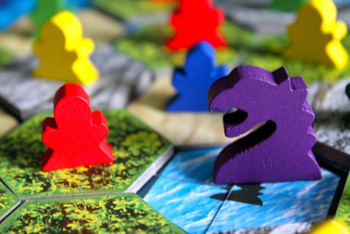
Back in ’82, when I was a lad of 11, Parker Brothers released a fantastic family game called Survive!, in which players frantically tried to evacuate their people from an island that was rapidly eroding into the sea. That game quickly became my favorite, a distinction it held for many years. Now, nearly two decades later, Stronghold Games has brought this classic back into print as Survive: Escape From Atlantis!, and I am pleased to report that it is every bit as fun as I remember. (Although back in my day we were just escaping from a run-of-the-mill sinking island—you kids today, with your new-fangled Atlantises…) As your population scrambles into boats or attempts to crawlstroke to safety, sharks pick off the stragglers, whales destroy your dinghies, and sea serpents cause your best laid plans to go horribly awry, all of which makes for a game that is somehow both perfect for families and viciously cutthroat. Survive is not only my top pick for this year’s G4, it surely deserves some of the credit for the Guide’s very existence, as exposure to this terrific design in my formative years no doubted fostered my lifelong love of games. [More info]
King of Tokyo
Publisher: IELLO
Players: 3-6
Time: 20 Minutes
Genre: Dice
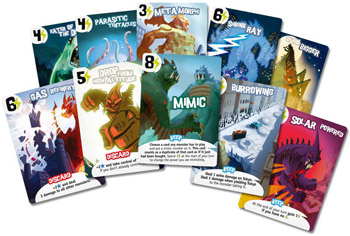
The “Yahtzee mechanism”—throw some dice and reroll twice—has been put to grand use recently. Roll Through the Ages, for example, lets players build a civilization from scratch in half an hour, while Elder Sign has them fending off Lovecraftian monsters. Now King of Tokyo combines the two by dropping monsters into the midst of civilization. Designed by Richard Garfield, the creator of Magic: The Gathering, King of Tokyo casts players as behemoths such as Gigazaur and Cyberbunny, wreaking havoc on the streets of Japan. All monsters begin equal, but collect mutations as the game goes on, everything from parasitic tentacles to the ability to breathe fire. The Yahtzee mechanism and the b-movie setting make this game feel familiar, but the variability in special cards and powers ensures every game is different. [More info]
Summoner Wars & Jab: Realtime Boxing
Publishers: Plaid Hat Games (Summoner Wars), Tasty Minstrel Games (Jab)
Players: 2
Time: 20 Minutes
Genre: Card

Speaking of Magic: The Gathering, fans of that game are raving over Summoner Wars, which approximates the feel of M:tG without the feel of slowly going destitute as you strive to collect all seven billion cards. Summoner Wars is “expandable,” but you always know what you are getting when you buy a new deck, be it the Cave Goblins or the Jungle Elves. And you can just pick up the Summoner Wars: Master Set to get six complete decks right out of the box. As in M:tG, players cast spells and bring creatures into play as they strive to defeat one another. Or, if you prefer to pummel your opponent with might instead of magic, check out Jab: Realtime Boxing. As a fan of the sweet science, I was impressed with how well Jab simulates the pacing of pugilism: with flurries of punches alternating with wary standoffs and the occasional clinch. Both games are nasty, brutish, short, and just the ticket when you are in the mood for a brawl. [More info on Summoner Wars, Jab]
Airlines Europe
Publisher: Rio Grande Games
Players: 2-5
Time: 90 Minutes
Genre: Family Strategy
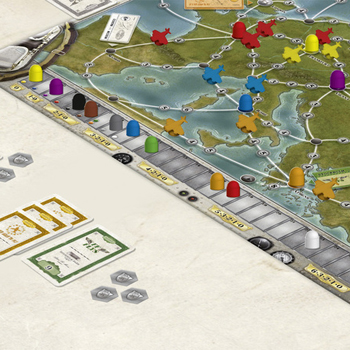
Sitting atop my list of Good Gift Games Greatest Hits is Alan R. Moon’s Ticket to Ride, which has players building railroad track across the USA. Airlines Europe, which is also designed by Moon, appears at first glance to be essentially the same game, albeit set on the other side of the globe and featuring tiny colorful jets instead of tiny colorful train cars. They are certainly kin, perhaps as close as first cousins, but in play feel considerably different. Because while Ticket is essentially a variant on rummy, Airline Europe also has an economic element, as players invest in stock and struggle for control of the routes they create. If you are already a fan of Ticket to Ride, this is a great next step, but Airlines Europe is also a great introduction to Moon’s unique flavor of game design. [More info]
7 Wonders
Publisher: Asmodee
Players: 2-7
Time: 30 Minutes
Genre: Family Strategy
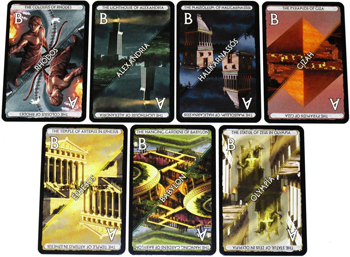
7 Wonders was released late last year, and I desperately tried to get my hands on a copy before writing the 2010 G4 to see if it was suitable for inclusion. It certainly seemed to be; the buzz around the game hailed it as simple, quick, engrossing, and accommodating of up to seven players. Unfortunately for me the advance press for 7 Wonders was too positive, and the game sold out everywhere within days of its release, leaving me empty handed. I played 7 Wonders several times in 2011, and I can confirm the hype was justified. Much of the appeal stems from the fact that 7 Wonders is a civilization-building game, which is always a popular genre amongst gamers. The pitfall of civ games, though, is that they tend to run long—like five to six hours long in some cases—with the time necessary to play increasing geometrically as you add more players. 7 Wonders avoids this problem by letting players take their turns simultaneously, which results in seven-player games of a length only slightly greater than those with three or four. 7 Wonders has a bit more of a learning curve than some of the others here, but it’s well worth the investment. [More info]
Ascending Empires
Publisher: Z-Man Games
Players: 2-4
Time: 90 Minutes
Genre: Finger Flicking. You heard me.
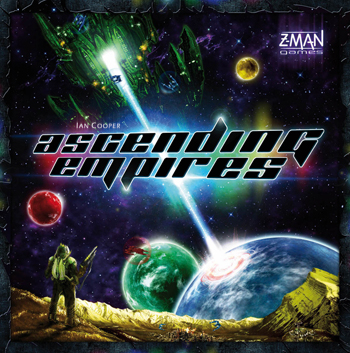
Here’s another game that uses a novel mechanism to compress a game of conquest into a manageable timeframe. As anyone who has played wargames can tell you, much of the playing time goes into movement, as you systematically march your troops across the map. Moving your starships in Ascending Empires, however, is a snap—a snap of your finger on the side of the small wooden discs, that is, to send them sliding across the board and into position, be it the orbit of planets or within firing range of opponents. This premise was also employed by last year’s Catacombs, but Empires adds enough strategic depth to the dexterity element to keep gamers coming back for more. [More info]
Skull & Roses
Publisher: Asmodee
Players: 3-6
Time: 45 Minutes
Genre: Bluffing
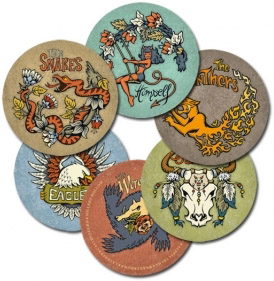
Many games have a bluffing component; Skull & Roses, however, is bluffing games distilled down to their essence. Each player owns four gorgeously illustrated coaster-sized disks, three of which show a rose on their face, the last of which bears a skull. A round is composed of three phases. First, a player uses his turn to place the disk of his choice onto the stack in front of his position at the table. Eventually someone will choose not to place a disk and instead announce a bid, after which each player must either raise the bid or call the last players bluff. Lastly, when a bluff is called, a number of disks are revealed from the top of the stacks equal to the final bid: If they are all roses, the bidding player scores a point; while one or more skulls signify defeat. Similar in feel to the traditional dice game Dudo and that perennial bar game Liar’s Poker, Skull & Roses may be the most beautiful way to shoot your nerves to hell. [More info]
Train of Thought
Publisher: Tasty Minstrel Games
Players: 2-7
Time: 30 Minutes
Genre: Party/Word
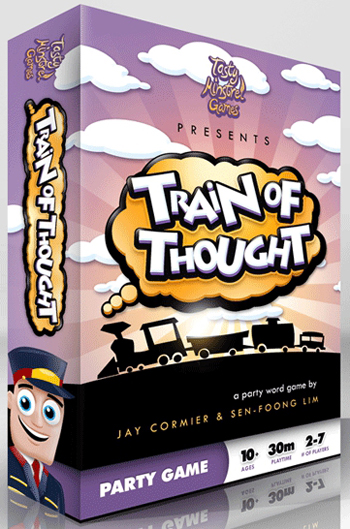
Charades, Taboo, Celebrities, Pictionary—there is no shortage of “get your partner to guess the word” games, both on the market and in the public domain. With more released every year, a game of this breed needs a novel twist on the formula to stand out from the crowd. Such a game is Train of Thought. And the constraint imposed on the clue-giver in ToT is a doozy. The active player is given a random word, and tries to get the rest of the group to guess it by giving them a three-word phrase; the first word of clue phrase, though, must be a second random word, completely unrelated to the first. Thus, you may find yourself trying to get the group to shout “cinema” with a three-word phrase that begins with “celery.” The clue giver can incorporate incorrect (but close) guesses into future clues for the same word, which allows the group to lurchingly hone in on the correct answer. There’s a great sense of satisfaction when you can smoothly guide a round of Train of Thought into the depot, but, as is usual with these types of party games, it’s often more fun to watch a round go completely off the rails. [More info]
Thunderstone: Dragonspire
Publisher: Alderac Entertainment Group
Players: 2-5
Time: 45-60 Minutes
Genre: Card/Deck Building
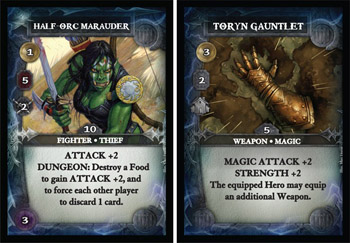
When I plugged Dominion in the 2008 G4, I did not realize it would spawn an entire genre of game design: that of “deck building.” Deck-building games are those in which you start with a small number of cards, use those cards to “buy” more cards, use your newly acquired cards to purchase yet more, and continue this cycle until you obtain the most valuable a deck you’re able. Of all the deck-building games that were released in Dominion’s wake, I enjoyed Thunderstone the most; and of all the incarnations of Thunderstone (there have been several), this year’s Thunderstone: Dragonspire is my favorite yet. Players purchase heroes, weapons, and other goods in town, or send their warriors off to the dungeon to slay monsters. As winning battles is the primary way to score points in the game, players must carefully weigh the benefits of amassing more equipment against taking up what arms they own and going in search of glory. Much as I admire Dominion for the elegance of its design, Dragonspire is the deck-building game I most enjoy. [More info]
Confusion: Espionage and Deception in the Cold War
Publisher: Stronghold Games
Players: 2
Time: 45 Minutes
Genre: Abstract Strategy
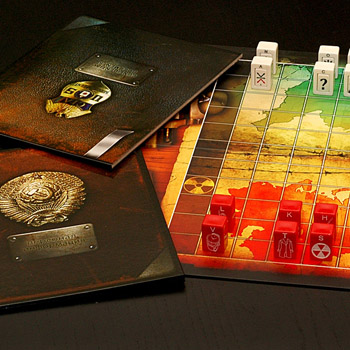
You start with 13 pieces on your side of a gameboard similar to that of checkers. Your goal: Move one of them to the center space, pick up the top-secret briefcase, and return it to your embassy. What could be simpler? Well…a lot of things, it turns out. Because the trick to Confusion: Espionage and Deception in the Cold War is that you don’t know how your own men move. Each piece has its movement printed on the back, visible to your opponent but not to you. So before you can grab the intel and hightail it back to home base, you must first deduce the identities of your own agents. Like the lovechild of chess and Clue, Confusion is another classic that Stronghold Games has brought back into print for the first time in decades. [More info]
